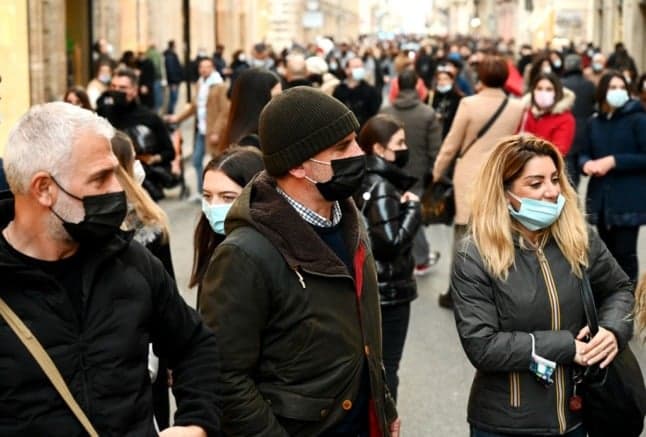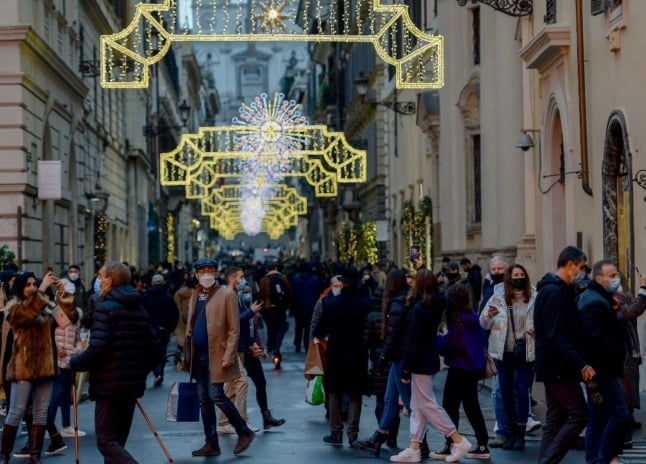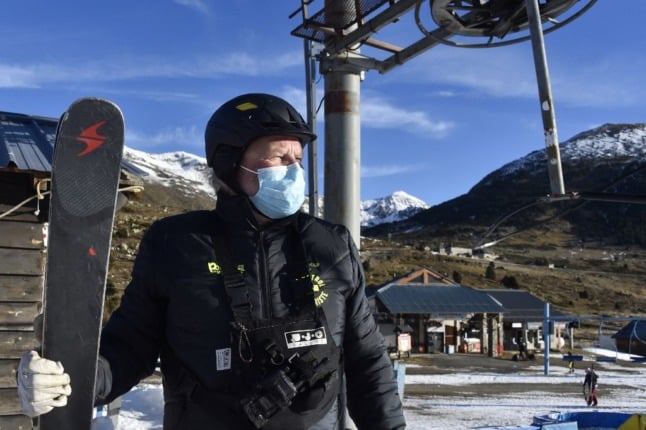EXPLAINED: What are the rules in Italy's Covid 'orange' zones?

Some regions of Italy risk being designated as Covid 'orange' zones with the government imposing new nationwide restrictions on the unvaccinated as cases rise. Here’s how the rules have been updated for 'orange' zones.
The Italian regions of Liguria, Calabria, Marche and the autonomous province of Trento could turn into a higher-risk 'orange' zone on Monday, as Covid cases and hospital admissions continue to soar.
No regions are currently under 'orange' zone restrictions, although some municipalities have already independently adopted the appropriate health measures for orange zones in a bid to relieve pressure on their hospitals.
A total of 11 Italian regions or autonomous provinces are currently moderate-risk ‘yellow’ zones, while the rest of the country remains for now in the least-restricted ‘white’ zone.
READ ALSO: What changes about life in Italy in January 2022
Since the government introduced new restrictions for the unvaccinated last month, a 'reinforced' Covid health certificate or 'super green pass' is required to access many venues and services across the country, while the rules on where the pass is needed vary for different zones.
The ‘super green pass’ is available only to those who are vaccinated against or have recovered from the virus – as opposed to the basic green pass, which can be obtained by testing negative for Covid every two to three days (depending on whether the test taken is molecular or rapid antigen).
It has already been made compulsory for access to almost all leisure, social or sporting activities in the country and the government is also considering extending it to all workplaces.
The health certificate is due to be a requirement at even more places from January 10th, including all restaurants and bars and public transport.
Calendar: When do Italy’s Covid-19 rules change?
The restrictions for those living in an 'orange' zone mainly affect the unvaccinated. Those who have a basic green pass will no longer be allowed to attend concerts and events that involve gatherings, will be banned from indoor restaurants and bars, places where cultural events take place, as well as parties and occasions that involve gatherings. This will cover all activities both indoors and outdoors.
At the time of writing, Italy’s health ministry has removed its official guidance relating to yellow, orange and red zone restrictions from its website. The Local has based this explainer on the government’s updated ‘super green pass’ guidance, and on Italian media reports.
Here’s what we know so far about Italy’s updated restrictions for 'orange' zone territories. We will update this page when the health ministry releases further official guidelines.
Travel
Travel within your own municipality is still allowed, while travel to other municipalities in the same region and to other regions is only allowed for reasons of necessity if you don't hold any green pass whatsoever - and must be justified by self-certification.
Holders of the basic and super green pass, on the other hand, can travel freely within and outside the region. An exception is the rule for travel from municipalities with a maximum of 5,000 inhabitants to other municipalities within 30 kilometres. Aside from not being allowed to go to provincial capitals, in this case, travel is permitted for everyone.
Going to work
To access public and private workplaces, with the exception of healthcare staff, police, teachers and emergency services workers for whom vaccination is compulsory, a basic green pass is sufficient for now. But the government is shortly due to make a decision on whether to extend the super green pass requirement to all workplaces.

Photo by Filippo MONTEFORTE / AFP
Shops
A super green pass is compulsory to access shopping centres on public holidays and 'pre-holidays' such as the night before a festival day. Grocery stores, newsagents, bookshops, pharmacies and tobacconists are exempt from any green pass requirement.
Health and social care facilities
In an 'orange' zone, you will only be able to enter with proof of a negative test or a third booster shot of an anti-Covid vaccine.
Bars, restaurants, hotels
As of January 10th, bars and restaurants require customers to show a 'super green pass' to eat at the counter and to sit both indoors and outdoors. This rule applies throughout Italy. In 'orange' zones, the super green pass will be compulsory for food service, both indoors and outdoors and for those staying in hotels.
Sport
Outdoor sports activities are still allowed, even in an 'orange' zone. From January 10th, gyms, swimming pools and changing rooms will require a super green pass. The same applies to indoor team sports.
Cultural activities and events
Indoor performances require a super green pass. This applies to theatres, concerts and cinemas, as well as museums and exhibitions. It is forbidden to eat inside the space where the event is taking place.
Skiing
In the 'orange' zone, you need a super green pass to buy ski passes for use of ski lifts and also cable cars, gondolas and chairlifts if they have closed canopies.

Photo by RAYMOND ROIG / AFP
Stadiums and sporting events
Access to sports events and competitions in stadiums and arenas is restricted to holders of a super green pass. The capacity of stadiums and arenas must not exceed 60 percent indoors and 75 percent outdoors.
Cinemas, theatres, museums and other activities
Access to cinemas, theatres, concert halls, entertainment venues and live music venues indoors is only allowed to those with the reinforced health certificate, as is entry to exhibitions and museums.
Discotheques and dance halls
These are closed currently until the end of January.
Weddings
Only those with a super green pass will be allowed to attend weddings, regardless of whether they are civil or religious ceremonies.
Health resorts and amusement parks
Access to wellness centres and spas, both outdoor and indoor, is closed to those who do not have a super green pass, unless you go to these places for health or therapeutic reasons. Theme and amusement parks are only open to those carrying a super green pass. Finally, access to cultural, social and recreational centres, indoors or outdoors, is forbidden to those without the super green pass, as is access to gambling halls, betting halls, bingo halls and casinos.
Public competitions
To take part in public competitions in the 'orange' zone, you must have at least a basic green pass, which can be obtained by a negative test result.
Local authorities can decide to impose stricter rules at short notice. Always check the latest restrictions in your province or town: find out how here.
For further details about Italy’s current Covid-19 health measures please see the Italian Health Ministry’s website (available in English).
Comments (1)
See Also
The Italian regions of Liguria, Calabria, Marche and the autonomous province of Trento could turn into a higher-risk 'orange' zone on Monday, as Covid cases and hospital admissions continue to soar.
No regions are currently under 'orange' zone restrictions, although some municipalities have already independently adopted the appropriate health measures for orange zones in a bid to relieve pressure on their hospitals.
A total of 11 Italian regions or autonomous provinces are currently moderate-risk ‘yellow’ zones, while the rest of the country remains for now in the least-restricted ‘white’ zone.
READ ALSO: What changes about life in Italy in January 2022
Since the government introduced new restrictions for the unvaccinated last month, a 'reinforced' Covid health certificate or 'super green pass' is required to access many venues and services across the country, while the rules on where the pass is needed vary for different zones.
The ‘super green pass’ is available only to those who are vaccinated against or have recovered from the virus – as opposed to the basic green pass, which can be obtained by testing negative for Covid every two to three days (depending on whether the test taken is molecular or rapid antigen).
It has already been made compulsory for access to almost all leisure, social or sporting activities in the country and the government is also considering extending it to all workplaces.
The health certificate is due to be a requirement at even more places from January 10th, including all restaurants and bars and public transport.
Calendar: When do Italy’s Covid-19 rules change?
The restrictions for those living in an 'orange' zone mainly affect the unvaccinated. Those who have a basic green pass will no longer be allowed to attend concerts and events that involve gatherings, will be banned from indoor restaurants and bars, places where cultural events take place, as well as parties and occasions that involve gatherings. This will cover all activities both indoors and outdoors.
At the time of writing, Italy’s health ministry has removed its official guidance relating to yellow, orange and red zone restrictions from its website. The Local has based this explainer on the government’s updated ‘super green pass’ guidance, and on Italian media reports.
Here’s what we know so far about Italy’s updated restrictions for 'orange' zone territories. We will update this page when the health ministry releases further official guidelines.
Travel
Travel within your own municipality is still allowed, while travel to other municipalities in the same region and to other regions is only allowed for reasons of necessity if you don't hold any green pass whatsoever - and must be justified by self-certification.
Holders of the basic and super green pass, on the other hand, can travel freely within and outside the region. An exception is the rule for travel from municipalities with a maximum of 5,000 inhabitants to other municipalities within 30 kilometres. Aside from not being allowed to go to provincial capitals, in this case, travel is permitted for everyone.
Going to work
To access public and private workplaces, with the exception of healthcare staff, police, teachers and emergency services workers for whom vaccination is compulsory, a basic green pass is sufficient for now. But the government is shortly due to make a decision on whether to extend the super green pass requirement to all workplaces.

Shops
A super green pass is compulsory to access shopping centres on public holidays and 'pre-holidays' such as the night before a festival day. Grocery stores, newsagents, bookshops, pharmacies and tobacconists are exempt from any green pass requirement.
Health and social care facilities
In an 'orange' zone, you will only be able to enter with proof of a negative test or a third booster shot of an anti-Covid vaccine.
Bars, restaurants, hotels
As of January 10th, bars and restaurants require customers to show a 'super green pass' to eat at the counter and to sit both indoors and outdoors. This rule applies throughout Italy. In 'orange' zones, the super green pass will be compulsory for food service, both indoors and outdoors and for those staying in hotels.
Sport
Outdoor sports activities are still allowed, even in an 'orange' zone. From January 10th, gyms, swimming pools and changing rooms will require a super green pass. The same applies to indoor team sports.
Cultural activities and events
Indoor performances require a super green pass. This applies to theatres, concerts and cinemas, as well as museums and exhibitions. It is forbidden to eat inside the space where the event is taking place.
Skiing
In the 'orange' zone, you need a super green pass to buy ski passes for use of ski lifts and also cable cars, gondolas and chairlifts if they have closed canopies.

Stadiums and sporting events
Access to sports events and competitions in stadiums and arenas is restricted to holders of a super green pass. The capacity of stadiums and arenas must not exceed 60 percent indoors and 75 percent outdoors.
Cinemas, theatres, museums and other activities
Access to cinemas, theatres, concert halls, entertainment venues and live music venues indoors is only allowed to those with the reinforced health certificate, as is entry to exhibitions and museums.
Discotheques and dance halls
These are closed currently until the end of January.
Weddings
Only those with a super green pass will be allowed to attend weddings, regardless of whether they are civil or religious ceremonies.
Health resorts and amusement parks
Access to wellness centres and spas, both outdoor and indoor, is closed to those who do not have a super green pass, unless you go to these places for health or therapeutic reasons. Theme and amusement parks are only open to those carrying a super green pass. Finally, access to cultural, social and recreational centres, indoors or outdoors, is forbidden to those without the super green pass, as is access to gambling halls, betting halls, bingo halls and casinos.
Public competitions
To take part in public competitions in the 'orange' zone, you must have at least a basic green pass, which can be obtained by a negative test result.
Local authorities can decide to impose stricter rules at short notice. Always check the latest restrictions in your province or town: find out how here.
For further details about Italy’s current Covid-19 health measures please see the Italian Health Ministry’s website (available in English).
Join the conversation in our comments section below. Share your own views and experience and if you have a question or suggestion for our journalists then email us at [email protected].
Please keep comments civil, constructive and on topic – and make sure to read our terms of use before getting involved.
Please log in here to leave a comment.